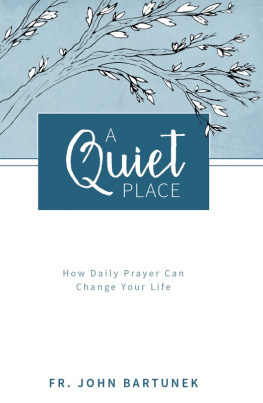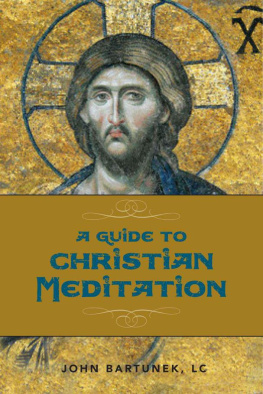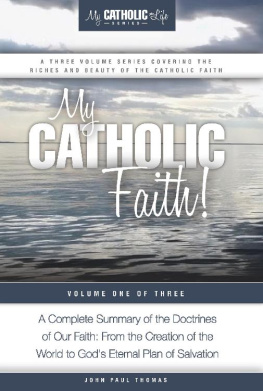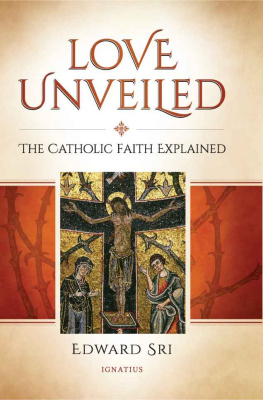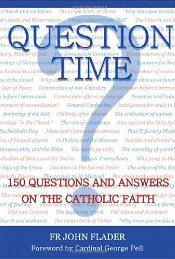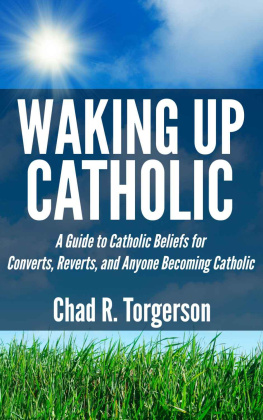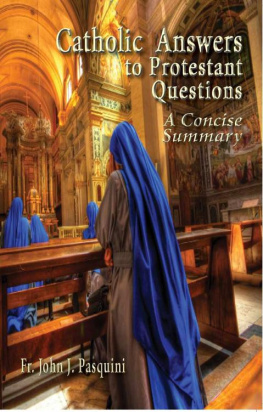Unless otherwise noted, Scripture passages have been taken from the Revised Standard Version , Catholic edition. Copyright 1946, 1952, 1971 by the Division of Christian Education of the National Council of Churches of Christ in the USA. Used by permission. All rights reserved.
Bartunek, John.
Father John Bartunek, L.C., S.T.D.
Includes bibliographical references.
ISBN 978-1-61636-822-7 ( alk. paper)
1. Christian lifeCatholic authorsMiscellanea. 2. Catholic Church
Doctrines.Miscellanea. 3. Theology, DoctrinalPopular works. I. Title.
Copyright 2014, John Bartunek, L.C., S.T.D. All rights reserved.
28 W. Liberty St.
Foreword
The adventure of the human spirit radiates with glory when God is the midst of the struggle for clarity and purpose. In this struggle, for the sincere and thoughtful pilgrim, questions never cease rising to the surface:
Why is there so much suffering?
Does God love me?
How can I know God?
What is prayer?
Will God speak to me in prayer?
What makes Catholicism different?
Properly aimed and answered, these questions can launch the soul into an engagement with God that it would have otherwise never known. It is in this powerful exchange of questions and answers that Fr. John Bartunek and I engaged with thousands of faithful pilgrims from all over the world.
The project began in 2009 when I asked Fr. John to join me on what I thought might have an effect on a small number of those seeking answers. Instead, just a few years later, we have touched every inhabited country of the world and, in the midst of it all, created the largest online community dedicated to the divine dialogue of hearts seeking ultimate answers.
Hundreds of thousands of God-seekers visit the Roman Catholic Spiritual Direction website (RCSpiritualDirection.com) every year. The surprising thing about this dialogue is how interesting and engaging it is even for those who are only marginally concerned with the musings and wrestling with eternal realities. Why the interest? Because even for those souls who have yet to fully engage, all have an innate desire for Goda desire for higher purpose and meaning. Heres how the Catechism of the Catholic Church states this reality:
The desire for God is written in the human heart, because man is created by God and for God; and God never ceases to draw man to himself. Only in God will he find the truth and happiness he never stops searching for:
The dignity of man rests above all on the fact that he is called to communion with God. This invitation to converse with God is addressed to man as soon as he comes into being. For if man exists, it is because God has created him through love, and through love continues to hold him in existence. He cannot live fully according to truth unless he freely acknowledges that love and entrusts himself to his creator. ( CCC 27)
In this sacred searching, these great themes are explored not in an abstract or theoretical way but in a gritty, down-to-earth, practical way that anyone can relate to. Within this fascinating formula of questions and answers and ensuing engagement, lives have been changed, hearts renewed and restored to faith, hope, and love. This is the power of leaning into the unknown that ignites the hearts of all who peer in.
Fr. John has done a great service to the Church. He has given his life to helping anyone within his reach understand what it means to be in authentic relationship with God. This book and the realities proposed within it will change your life, if you will only lean in and never stop asking and seeking.
Thus says the Lord: Stand by the roads, and look,
and ask for the ancient paths,
where the good way is; and walk in it,
and find rest for your souls. (Jeremiah 6:16)
Dan Burke, executive director of EWTNs National Catholic Register
Chapter One: Prayer
In todays world, which is so fast-paced, noisy, and distracting, its more important than ever to carve out quiet time to be alone with God, to reflect on the deep Catholic truths that nourish our souls. Its no longer enough simply to attend Mass on Sundayat least, not if we really want to reach maturity in our Christian lives. Society no longer supports Christian values or worldview as it once did, so we need to intentionally create space for the Holy Spirit to give us the support we need directly. Whether you are a beginner or a veteran in prayer, if you sincerely want to go deeper in your prayer life, I hope the answers in this chapter will prove useful to you.
How Can I Hear God Speaking to Me in Prayer?
The phrase conversation with God describes Christian prayer beautifully. Christ has revealed that God is a real person, and that he is interestedpassionately interestedin our lives, our friendship, our closeness. For Christians then, prayer, as Pope Benedict explained when he visited Yonkers, New York, in 2007, is an expression of our personal relationship with God. And that relationship, the Holy Father went on to say, is what matters most.
Parameters of Faith
When we pray, God speaks to us. First of all, though, we need to remember that our relationship with God is based on faith. Faith gives us access to knowledge that goes beyond what we can perceive by our senses. By faith, for example, we know that Christ is truly present in the Eucharist, even though our senses only perceive the appearances of bread and wine. Whenever a Christian prays, the prayer takes place within this atmosphere of faith.
When I address God in vocal prayer, I know that he is listening to me, even if I dont feel his presence with my senses or emotions. When I praise him, ask things of him, adore him, thank him, tell him I am sorryin all these expressions of prayer, I know by faith (not necessarily by my senses or my feelings) that God is listening, interested, and that he cares. If we try to understand Christian prayer outside of this atmosphere of faith, we will get nowhere.
Keeping that in mind, lets look at the three ways God speaks to us in prayer.
1. The Gift of Consolation
First of all, God can speak to us by giving us what spiritual writers call consolation . Through consolation, he touches the soul and allows it to be comforted and strengthened by a felt awareness of his love, his presence, his goodness, his power, and his beauty.
This consolation can flow directly from the meaning of the words of a vocal prayer. For instance, when I pray Blessed Cardinal Newmans famous Lead, Kindly Light prayer, God may boost my hope and confidence, simply because the meaning of the words nourish and revitalize my awareness of Gods power and goodness.
Consolation can also flow from the reflection and pondering involved in mental prayer. As I read and reflect slowly, prayerfully on the parable of the Prodigal Son, for example, I can feel my soul being comforted by that picture of the Father embracing the repentant younger brother. That picture of Gods love comes to my mind, and it gives me a renewed awareness of Gods mercy and goodness. God is so merciful! I think to myself, and I feel the warmth of his mercy in my heart. That image and those ideas are mine, insofar as they arise in my mind, but they are from God, insofar as they arose in response to my consideration of Gods revelation , in an atmosphere of faith.


